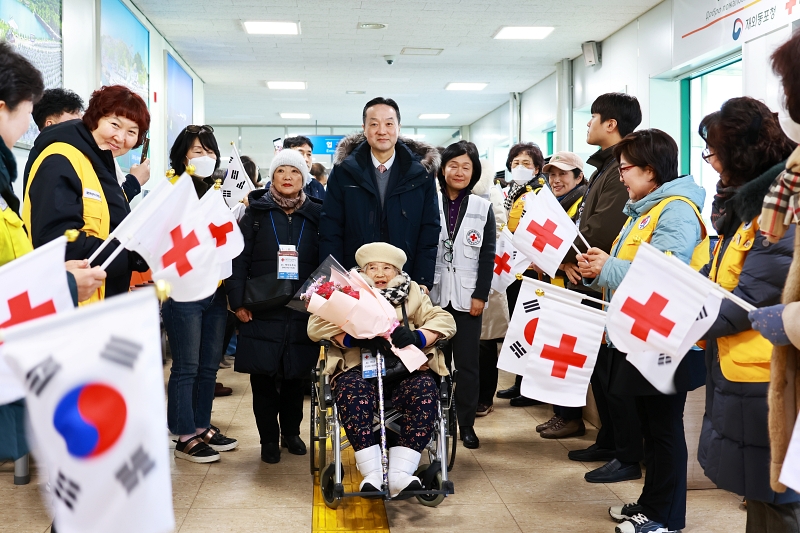
Overseas Koreans Agency (OKA) Vice Commissioner Byun Chul-hwan (center) on Feb. 9 pushes the wheelchair of Choi Gun-ja, 92, the eldest among a group of ethnic Koreans moving back to Korea from Sakhalin Island of Russia, at the international passenger terminal of the Port of Donghae in Donghae, Gangwon-do Province. (OKA)
By Park Hye Ri
A hundred ethnic Koreans forced to relocate to Sakhalin Island of Russia during Japanese rule of the Korean Peninsula (1910-45) and their descendants returned to their motherland on Feb. 9.
The Overseas Koreans Agency (OKA) and the Korean Red Cross (KRC), both of which supervise a project to repatriate such people to Korea, said they held a welcoming ceremony that day for the group at the international passenger terminal of the Port of Donghae in Donghae, Gangwon-do Province.
Attending the event to welcome the group after the latter's 80 years abroad were OKA Vice Commissioner Byun Chul-hwan and KRC Director Kim Eun-young.
OKA said 270 ethnic Koreans from the island are scheduled to resettle in Korea including Lee Son-gwi, 100, first-generation ethnic Koreans and their descendants. The remaining 170 will move back individually by year's end.
"The government will always be with our brethren from Sakhalin so that their new start in their homeland won't be lonely," Vice Commissioner Byun said in his welcoming speech. "We'll do our best to listen to our brethren from Sakhalin to enable their stable resettlement in Korea."
Choi Gun-ja, 92, the oldest among the returnees in the group, said, "I thank the Korean government for allowing me to be buried in my fatherland," adding, "I'm so glad that my fatherland is greatly developed and clean."
Based on the Special Act on Assistance to Sakhalin Koreans, a government project seeks to help their permanent move to and settlement in Korea. Since 1992, 5,340 of them have returned.
Relevant regulations were partially amended last year to expand eligibility for such support from one direct descendant to children.
hrhr@korea.kr